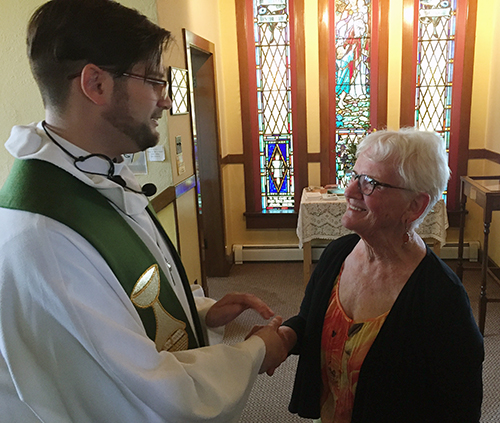
By David F. Rooney
The United Church has a new minister to tend its flock: the Rev. David Cooke. And one of the things that makes him different is the fact that he is a Millennial unlike two predecessors, Ken Jones and Harvie Barker, who were Baby Boomers.
The Ontario-born Cooke is just 30 years old and was ordained this spring. He studied English and creative writing at York University. Then, after a stint as a manual labourer at a meat-processing plant that permanently transformed him into a vegetarian, he studied for a Master’s degree in Divinity at Emmanuel College at the University of Toronto.
David is a humble young man and while he hopes to make a difference here in Revelstoke, he doesn’t take himself overly seriously.
“I wasn’t really thnking of ministry because, growing up, I was a very shy person,” he said in a recent interview at Sangha Bean Café.
“I didn’t really think I had people skills. I was shy, nervous… very geeky. But at that time I got into a relationship with my now-husband.”
Like any young couple David said he and his husband, Christopher, hope that Revelstoke will be a good place for them.
“At about the same time I started developing a deeper sense of spirituality,” he said, adding that he was at the time working in the Ontario hospital system.
It’s not uncommon for men and women drawn to careers in the clergy to feel a calling or even moments when they feel God’s presence in their lives. David felt that.
“I felt God’s presence,” he said. “But they way I see it, spirituality is something nebulous and really hard to define. Religion is sort of the language we give to it that helps us put it — helps me put it — in concrete terms. It’s something that, at the end of the day, can only be experienced. It can’t really be taught. It was like something or someone really understood me and that helped me and gave me comfort. I put that in terms of feeling God’s presence.
“I think that’s why I don’t look down on people who say they’re spiritual but not religious.”
That’s an interesting comment as a lot of Millennials and even, truth be known, Baby Boomers think of themselves as spiritual but not necessarily religious individuals.
But believing you have a calling for the ministry is one thing and believing that God Himself has a plan for you is something else entirely, David said, adding that the very notion “is complicated.”
David says his favourite passage in the Old Testament is the story of Elijah hiding in a cave when he hears God’s voice calling to him. In a YouTube video of a speech he gave to the Hamilton Conference Executive just prior to his ordination he also said he “identifies more with the Jesus of the Cross than the Jesus of the Tomb.”
“I feel a need to be part of something larger than myself – part of something that matters,” he said. “I wonder if that is the holy shift that needs to happen. That that shift in thinking is the kind of thing I can get behind, to get out of the cave of cynicism and false realism and embrace the possibilities of hope and joy… we change ourselves for the sake of changing the world.”
Those are fairly complex and deep thoughts for a young man but you can hear echoes of those thoughts in his weekly sermons.
During his second sermon on Sunday, July 17, David related part of an ongoing conversation on Facebook with an atheist friend who asked him: “What good does prayer do?”
“I come to (the answer to that question) from having worked for the last three years in a hospital,” he told the congregation. “I always looked at it as a tool… to help you get through very difficult times.”
It’s also something that helps him get through the days when he feels powerless. And that is something we can all understand no matter who we are or how old we are.
Welcome to Revelstoke, David.
Please activate the YouTube player below to watch his pre-ordination speech:



